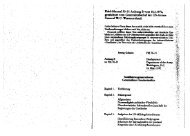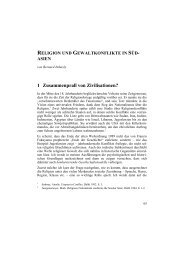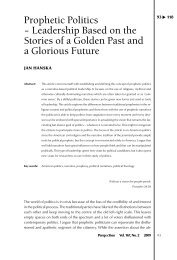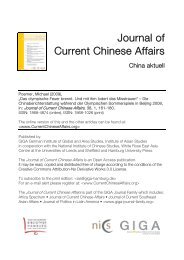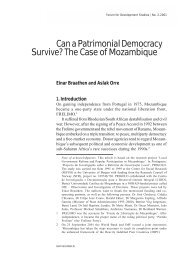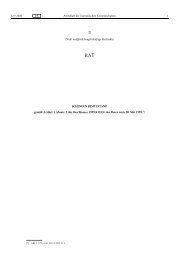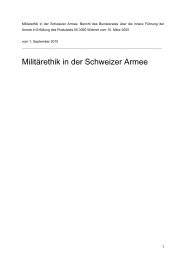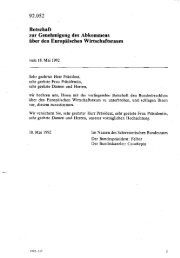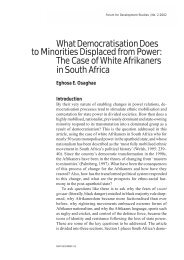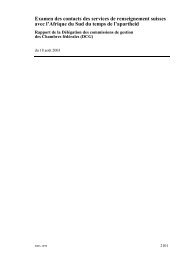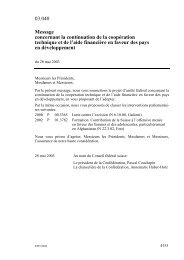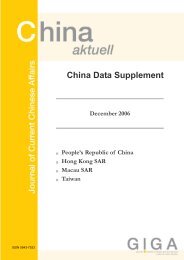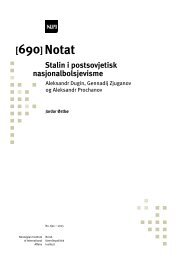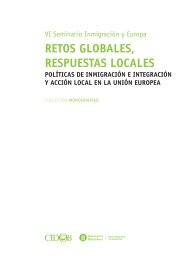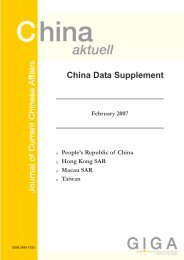- Seite 1 und 2:
Serienherausgeber UMSTRITTENE SCHWE
- Seite 3 und 4:
Serienherausgeber Andreas Wenger un
- Seite 5 und 6:
Konferenz Städtischer Polizeidirek
- Seite 7 und 8:
Vorwort Im Rahmen der Erarbeitung d
- Seite 9 und 10:
Einleitung Mit Blick auf eine breit
- Seite 11 und 12:
Einleitung weit mehr zu einem Abbil
- Seite 13 und 14:
Einleitung *** Dürfte die Schweize
- Seite 15 und 16:
POLITISCHE PARTEIEN
- Seite 17 und 18:
Politische Parteien müssen wir ehr
- Seite 19 und 20:
Politische Parteien Reformschwung d
- Seite 21 und 22:
Politische Parteien permanente Fort
- Seite 23 und 24:
Politische Parteien Die Überprüfu
- Seite 25 und 26:
Politische Parteien Gadient Brigitt
- Seite 27 und 28:
Politische Parteien vor Ort im Sinn
- Seite 29 und 30:
Politische Parteien Bericht muss au
- Seite 31 und 32:
Politische Parteien ergibt sich, da
- Seite 33 und 34:
Politische Parteien Vernetzung gef
- Seite 35 und 36:
Politische Parteien entsprechenden
- Seite 37 und 38:
Politische Parteien miteinander ver
- Seite 39 und 40:
Politische Parteien tig, dass es ei
- Seite 41 und 42:
Politische Parteien denen militäri
- Seite 43 und 44:
Politische Parteien richtig, aber s
- Seite 45 und 46:
Politische Parteien ein Schlag gege
- Seite 47 und 48:
Politische Parteien und nichtstaatl
- Seite 49 und 50:
Politische Parteien • Soziale Spa
- Seite 51 und 52:
Politische Parteien Die FDP-Liberal
- Seite 53 und 54:
Politische Parteien Die drei in der
- Seite 55 und 56:
Politische Parteien triebene Armeem
- Seite 57 und 58:
Politische Parteien Armee nicht von
- Seite 59 und 60:
Politische Parteien Von Bedeutung i
- Seite 61 und 62:
Politische Parteien scher Ebene dar
- Seite 63 und 64:
Grüne Partei der Schweiz www.gruen
- Seite 65 und 66:
Grüne Partei der Schweiz als Partn
- Seite 67 und 68:
Grüne Partei der Schweiz heitspoli
- Seite 69 und 70:
Grüne Partei der Schweiz volle Fun
- Seite 71 und 72:
Grüne Partei der Schweiz avons nos
- Seite 73 und 74:
Schweizerische Volkspartei (SVP) ww
- Seite 75 und 76:
Schweizerische Volkspartei Falsch w
- Seite 77 und 78:
Die nationalen Sicherheitsinteresse
- Seite 79 und 80:
Schweizerische Volkspartei die «id
- Seite 81 und 82:
Schweizerische Volkspartei Regional
- Seite 83 und 84:
Diskussion Schweizerische Volkspart
- Seite 85 und 86:
Schweizerische Volkspartei Armee an
- Seite 87 und 88:
Einheiten sind dem Kommando der Ter
- Seite 89 und 90:
Sozialdemokratische Partei der Schw
- Seite 91 und 92:
Sozialdemokratische Partei der Schw
- Seite 93 und 94:
Sozialdemokratische Partei der Schw
- Seite 95 und 96:
Sozialdemokratische Partei der Schw
- Seite 97 und 98:
Sozialdemokratische Partei der Schw
- Seite 99 und 100:
Sozialdemokratische Partei der Schw
- Seite 101 und 102:
SICHERHEITS- UND AUSSENPOLITISCHE G
- Seite 103 und 104:
Sicherheits- und aussenpolitische G
- Seite 105 und 106:
Sicherheits- und aussenpolitische G
- Seite 107 und 108:
Sicherheits- und aussenpolitische G
- Seite 109 und 110:
Sicherheits- und aussenpolitische G
- Seite 111 und 112:
Sicherheits- und aussenpolitische G
- Seite 113 und 114:
Sicherheits- und aussenpolitische G
- Seite 115 und 116:
Sicherheits- und aussenpolitische G
- Seite 117 und 118:
Sicherheits- und aussenpolitische G
- Seite 119 und 120:
Sicherheits- und aussenpolitische G
- Seite 121 und 122:
Sicherheits- und aussenpolitische G
- Seite 123 und 124:
Sicherheits- und aussenpolitische G
- Seite 125 und 126:
Sicherheits- und aussenpolitische G
- Seite 127 und 128:
Sicherheits- und aussenpolitische G
- Seite 129 und 130:
Sicherheits- und aussenpolitische G
- Seite 131 und 132:
Sicherheits- und aussenpolitische G
- Seite 133 und 134:
Sicherheits- und aussenpolitische G
- Seite 135 und 136:
Sicherheits- und aussenpolitische G
- Seite 137 und 138:
Sicherheits- und aussenpolitische G
- Seite 139 und 140:
Sicherheits- und aussenpolitische G
- Seite 141 und 142:
Sicherheits- und aussenpolitische G
- Seite 143 und 144:
Sicherheits- und aussenpolitische G
- Seite 145 und 146:
Sicherheits- und aussenpolitische G
- Seite 147 und 148:
Sicherheits- und aussenpolitische G
- Seite 149 und 150:
Sicherheits- und aussenpolitische G
- Seite 151 und 152:
Sicherheits- und aussenpolitische G
- Seite 153 und 154:
Sicherheits- und aussenpolitische G
- Seite 155 und 156:
Sicherheits- und aussenpolitische G
- Seite 157 und 158:
Sicherheits- und aussenpolitische G
- Seite 159 und 160:
Sicherheits- und aussenpolitische G
- Seite 161 und 162:
Sicherheits- und aussenpolitische G
- Seite 163 und 164:
Schweizerische Gesellschaft für Au
- Seite 165 und 166:
2. Was verstehen Sie unter Sicherhe
- Seite 167 und 168:
Schweizerische Gesellschaft für Au
- Seite 169 und 170:
tem kennenlernen möchten. Ich kann
- Seite 171 und 172:
Schweizerische Gesellschaft für Au
- Seite 173 und 174:
Schweizerische Gesellschaft für Au
- Seite 175 und 176:
Angehörte Frisch Toni Vorstandsmit
- Seite 177 und 178:
Sicherheits- und aussenpolitische G
- Seite 179 und 180:
Sicherheits- und aussenpolitische G
- Seite 181 und 182:
Sicherheits- und aussenpolitische G
- Seite 183 und 184:
Sicherheits- und aussenpolitische G
- Seite 185 und 186:
Sicherheits- und aussenpolitische G
- Seite 187 und 188:
Sicherheits- und aussenpolitische G
- Seite 189 und 190:
Sicherheits- und aussenpolitische G
- Seite 191 und 192:
Konferenz der Kantonalen Justiz- un
- Seite 193 und 194:
Konferenz der Kantonalen Justiz- un
- Seite 195 und 196:
Konferenz der Kantonalen Justiz- un
- Seite 197 und 198:
Konferenz der Kantonalen Justiz- un
- Seite 199 und 200:
Konferenz der Kantonalen Justiz- un
- Seite 201 und 202:
Konferenz der Kantonalen Justiz- un
- Seite 203 und 204:
Konferenz der Kantonalen Polizeikom
- Seite 205 und 206:
Konferenz der Kantonalen Polizeikom
- Seite 207 und 208:
Konferenz der Kantonalen Polizeikom
- Seite 209 und 210:
Konferenz der Kantonalen Polizeikom
- Seite 211 und 212:
Konferenz der Kantonalen Polizeikom
- Seite 213 und 214:
Konferenz der Kantonalen Polizeikom
- Seite 215 und 216:
Konferenz der Kantonalen Polizeikom
- Seite 217 und 218:
Anhörende Konferenz der Kantonalen
- Seite 219 und 220:
Kantone, Polizei, Bevölkerungsschu
- Seite 221 und 222:
Kantone, Polizei, Bevölkerungsschu
- Seite 223 und 224:
Kantone, Polizei, Bevölkerungsschu
- Seite 225 und 226:
Kantone, Polizei, Bevölkerungsschu
- Seite 227 und 228:
Kantone, Polizei, Bevölkerungsschu
- Seite 229 und 230:
Kantone, Polizei, Bevölkerungsschu
- Seite 231 und 232:
Kantone, Polizei, Bevölkerungsschu
- Seite 233 und 234:
Kantone, Polizei, Bevölkerungsschu
- Seite 235 und 236:
Militär- und Zivilschutzdirektoren
- Seite 237 und 238:
Militär- und Zivilschutzdirektoren
- Seite 239 und 240:
Was ist der Stellenwert der Neutral
- Seite 241 und 242:
Militär- und Zivilschutzdirektoren
- Seite 243 und 244:
sich weiter. Die Risiken und Bedroh
- Seite 245 und 246:
Militär- und Zivilschutzdirektoren
- Seite 247 und 248:
Militär- und Zivilschutzdirektoren
- Seite 249 und 250:
Militär- und Zivilschutzdirektoren
- Seite 251 und 252:
polizeilichen und der nichtpolizeil
- Seite 253 und 254:
• alle Aspekte der nationalen Sic
- Seite 255 und 256:
Militär- und Zivilschutzdirektoren
- Seite 257 und 258:
Hasler Ernst: (zu Schär Andreas) I
- Seite 259 und 260:
Kantone, Polizei, Bevölkerungsschu
- Seite 261 und 262:
Kantone, Polizei, Bevölkerungsschu
- Seite 263 und 264:
Kantone, Polizei, Bevölkerungsschu
- Seite 265 und 266:
Kantone, Polizei, Bevölkerungsschu
- Seite 267 und 268:
Kantone, Polizei, Bevölkerungsschu
- Seite 269 und 270:
Schweizerische Offiziersgesellschaf
- Seite 271 und 272:
Sicherheitspolitische Trends Schwei
- Seite 273 und 274:
terung des wirtschaftlichen Umfelde
- Seite 275 und 276:
Schweizerische Offiziersgesellschaf
- Seite 277 und 278:
zurückhaltende Aussenpolitik zu be
- Seite 279 und 280:
Schweizerische Offiziersgesellschaf
- Seite 281 und 282:
Jahren laufenden Daueraufträgen et
- Seite 283 und 284:
zuweisen. Was spricht für diese L
- Seite 285 und 286:
Schweizerische Offiziersgesellschaf
- Seite 287 und 288:
Schweizerische Offiziersgesellschaf
- Seite 289 und 290:
Greminger Thomas, Botschafter Dr. C
- Seite 291 und 292:
Militärische Verbände Im zweiten
- Seite 293 und 294:
Militärische Verbände Die Schweiz
- Seite 295 und 296:
Militärische Verbände 308 • Das
- Seite 297 und 298:
Militärische Verbände tage reduzi
- Seite 299 und 300:
Militärische Verbände müssen, da
- Seite 301 und 302:
Militärische Verbände Homberger R
- Seite 303 und 304:
Militärische Verbände Catrina Chr
- Seite 305 und 306:
WIRTSCHAFTSVERBÄNDE
- Seite 307 und 308:
Wirtschaftsverbände Was sind aus u
- Seite 309 und 310:
Wirtschaftsverbände die auf die Si
- Seite 311 und 312:
Wirtschaftsverbände Was sind die n
- Seite 313 und 314:
Wirtschaftsverbände Rücksicht neh
- Seite 315 und 316:
Wirtschaftsverbände Die Synergien
- Seite 317 und 318:
Wirtschaftsverbände individuell sc
- Seite 319 und 320:
Wirtschaftsverbände nationale Rüs
- Seite 321 und 322:
Schweizerischer Gewerbeverband (sgv
- Seite 323 und 324:
Schweizerischer Gewerbeverband Aufw
- Seite 325 und 326:
Schweizerischer Gewerbeverband Welc
- Seite 327 und 328:
Schweizerischer Gewerbeverband Grun
- Seite 329 und 330:
Schweizerischer Gewerbeverband Bigl
- Seite 331 und 332:
Schweizerischer Gewerbeverband betr
- Seite 333 und 334:
Schweizerischer Gewerbeverband Bigl
- Seite 335 und 336:
SWISSMEM, Schweizer Maschinen-, Ele
- Seite 337 und 338:
SWISSMEM der» auftreten. Internati
- Seite 339 und 340:
SWISSMEM Folgerungen für die Indus
- Seite 341 und 342:
SWISSMEM Folgerungen für die Indus
- Seite 343 und 344:
Definition einer klareren Aufgabent
- Seite 345 und 346:
SWISSMEM stark vernetzt; wir betrei
- Seite 347 und 348:
SWISSMEM Deutschschweiz, nicht zule
- Seite 349 und 350:
«Vollkorn»-Ausgabe, wie sie bishe
- Seite 351 und 352:
INSTITUTE
- Seite 353 und 354:
Institute einer nicht nachhaltigen
- Seite 355 und 356:
Institute Ansatz zur Prävention un
- Seite 357 und 358:
Institute der Kantone in die strate
- Seite 359 und 360:
Institute Aufgaben der Armee Die mi
- Seite 361 und 362:
Institute die Schweiz mit dem Siche
- Seite 363 und 364:
Institute mich ist die Frage der si
- Seite 365 und 366:
Institute Zwahlen Pedro: Ich habe z
- Seite 367 und 368:
Institute der Weisheit letzter Schl
- Seite 369 und 370:
Institute diesen Schnittstellen ent
- Seite 371 und 372:
Institute einer wachsenden Sicherhe
- Seite 373 und 374:
Institute 3. Was sind die gefährli
- Seite 375 und 376:
Institute Kooperation liegt im Eige
- Seite 377 und 378:
Institute de l’ONU en association
- Seite 379 und 380:
Institute nalité). L’utilisation
- Seite 381 und 382:
Institute s’intéressent pas à c
- Seite 383 und 384:
Institute auf die Erwartungshaltung
- Seite 385 und 386:
Institute es dennoch zu solchen Vor
- Seite 387 und 388:
Institute Tanner Fred: Sie sprechen
- Seite 389 und 390:
Institute Angehörte Fellay Luc Spe
- Seite 391 und 392:
Institute tion proliferation, regio
- Seite 393 und 394:
Institute Having described these th
- Seite 395 und 396:
Institute logic applies to all stat
- Seite 397 und 398:
Institute In Switzerland, this migh
- Seite 399 und 400:
Institute latter might turn into an
- Seite 401 und 402:
Institute in their bases with helic
- Seite 403 und 404:
Institute My personal reflections o
- Seite 405 und 406:
Institute officials of many other c
- Seite 407 und 408:
Institute of expertise in the Centr
- Seite 409 und 410:
Institute ausgeübte Gewalt, sofern
- Seite 411 und 412:
Institute heitspolitik definiert is
- Seite 413 und 414:
Institute Zum Punkt A): Die Neutral
- Seite 415 und 416:
Institute cen in diesen Politikfeld
- Seite 417 und 418:
Institute scheiden. In diesem Sinne
- Seite 419 und 420:
Institute beim Ausfall der AHV die
- Seite 421 und 422:
Institute inländischen Herausforde
- Seite 423 und 424:
Institute Anhörende Catrina Christ
- Seite 425 und 426:
Römisch-katholische Kirche der Sch
- Seite 427 und 428:
Was verstehen wir unter Sicherheits
- Seite 429 und 430:
Römisch-katholische Kirche der Sch
- Seite 431 und 432:
Die politische Stabilität und die
- Seite 433 und 434:
Römisch-katholische Kirche der Sch
- Seite 435 und 436:
Römisch-katholische Kirche der Sch
- Seite 437 und 438:
zeugungsarbeit zu leisten, während
- Seite 439 und 440:
Landeskirchen Gott verweigert. 1 (D
- Seite 441 und 442:
Landeskirchen «Menschliche Sicherh
- Seite 443 und 444:
Landeskirchen Wenn der Anspruch ein
- Seite 445 und 446:
Landeskirchen Bericht von 1999 wird
- Seite 447 und 448:
Landeskirchen 5. Das Friedenspotent
- Seite 449 und 450:
Landeskirchen 468 struktur für den
- Seite 451 und 452:
Landeskirchen ein Beispiel dafür,
- Seite 453 und 454:
Landeskirchen die Armee allein, wel
- Seite 455 und 456:
Landeskirchen hang könnten meiner
- Seite 457 und 458:
VERSCHIEDENE
- Seite 459 und 460:
Verschiedene Ein bedeutendes Gefahr
- Seite 461 und 462:
Verschiedene Was verstehen wir unte
- Seite 463 und 464:
Verschiedene NAP 1325 Die Resolutio
- Seite 465 und 466:
Verschiedene plätzen oder die Sens
- Seite 467 und 468:
Verschiedene Zapfl Rosmarie: (zu Ve
- Seite 469 und 470:
Verschiedene ganisationen zusammen,
- Seite 471 und 472:
Verschiedene Angehörte Verrey Etie
- Seite 473 und 474:
Verschiedene Jahren Existenz vermei
- Seite 475 und 476:
Verschiedene neue entstehen. Die Kr
- Seite 477 und 478:
Verschiedene in Afghanistan und im
- Seite 479 und 480:
Verschiedene Die Formen des nächst
- Seite 481 und 482:
Verschiedene der Gedenktafel gestri
- Seite 483 und 484:
Verschiedene ob sie am Ende eines D
- Seite 485 und 486:
Verschiedene Thalmann Anton: Ihre A
- Seite 487 und 488:
Verschiedene Führungsübungen abzu
- Seite 489 und 490:
Verschiedene Vergleich mit den Gros
- Seite 491 und 492:
Verschiedene Als Verantwortlicher h
- Seite 493 und 494:
Verschiedene • Mark Leonard: What
- Seite 495 und 496:
Dr. Hans-Ulrich Ernst, ehemaliger G
- Seite 497 und 498:
Grundstrategie: Autonomie, Kooperat
- Seite 499 und 500:
Die Dreiergliederung galt von 1891
- Seite 501 und 502:
Hans-Ulrich Ernst Schweiz relevant
- Seite 503 und 504:
Hans-Ulrich Ernst chés in den WK m
- Seite 505 und 506:
Lösungsansatz: Intelligenter Mix a
- Seite 507 und 508:
Hans-Ulrich Ernst wäre noch zu def
- Seite 509 und 510: Hans-Ulrich Ernst diesbezüglich im
- Seite 511 und 512: Hans-Ulrich Ernst Übungen durchgef
- Seite 513 und 514: Hans-Ulrich Ernst zip, wobei ich f
- Seite 515 und 516: politischen Bericht wird diese Frag
- Seite 517 und 518: Verschiedene 540 Naturgewalten. Pir
- Seite 519 und 520: Verschiedene 542 Zeitbombe tickt, w
- Seite 521 und 522: Verschiedene b) Als weitere gefähr
- Seite 523 und 524: Verschiedene müsste jedenfalls gel
- Seite 525 und 526: Verschiedene Ich bin sehr einversta
- Seite 527 und 528: Verschiedene auch die Mittel nicht
- Seite 529 und 530: Dr. Bruno Lezzi, ehemaliger Inlandr
- Seite 531 und 532: verteidigungspolitische Weissbuch.
- Seite 533 und 534: Bruno Lezzi Bedrohung, auf die man
- Seite 535 und 536: Bruno Lezzi auf die Territorialvert
- Seite 537 und 538: Bruno Lezzi • Es wäre falsch, da
- Seite 539 und 540: Verschiedene bei dieser Auslegung d
- Seite 541 und 542: Verschiedene Ausweichen allein reic
- Seite 543 und 544: Verschiedene • Auch seltenen Erei
- Seite 545 und 546: Verschiedene Moment wissen, was sie
- Seite 547 und 548: Verschiedene Götz Andreas: Zu den
- Seite 549 und 550: AUSLAND
- Seite 551 und 552: Ausland Finally, I will speak as an
- Seite 553 und 554: Ausland was the determination by th
- Seite 555 und 556: Ausland So what are the implication
- Seite 557 und 558: Ausland conflict down to conflict o
- Seite 559: Ausland but no state has ever done
- Seite 563 und 564: Ausland Diskussion Thalmann Anton:
- Seite 565 und 566: Ausland Catrina Christian: What you
- Seite 567 und 568: Ausland What this reflects is partl
- Seite 569 und 570: Ausland dently and dangerously, but
- Seite 571 und 572: Ausland confrontation with another
- Seite 573 und 574: Ausland wonders what Australia need
- Seite 575 und 576: Jean-Marie Guéhenno, former Head o
- Seite 577 und 578: • La menace d’une agression sur
- Seite 579 und 580: B - La neutralité doit être compl
- Seite 581 und 582: Prof. François Heisbourg, Préside
- Seite 583 und 584: fait très limitée. Cela a des imp
- Seite 585 und 586: François Heisbourg l’URSS et l
- Seite 587 und 588: François Heisbourg coût décroiss
- Seite 589 und 590: dernières années. Ils sont moins
- Seite 591 und 592: François Heisbourg de différent s
- Seite 593 und 594: des petits pays comme Singapour ou
- Seite 595 und 596: Ausland longer the primary mode of
- Seite 597 und 598: Ausland intelligence is an asset th
- Seite 599 und 600: Ausland political refugees. A secur
- Seite 601 und 602: Ausland enhance Swiss security thro
- Seite 603 und 604: Ausland equality is a faraway goal
- Seite 605 und 606: Ausland Loğoğlu Faruk: Let me fir
- Seite 607 und 608: Ausland that we really have to give
- Seite 609 und 610: Ausland ficient time and energy to
- Seite 611 und 612:
Ausland expenditure measured as a p
- Seite 613 und 614:
Ausland cil or the General Assembly
- Seite 615 und 616:
Ausland is a free-floating and some
- Seite 617 und 618:
Ausland not operationalized in the
- Seite 619 und 620:
Ausland Diskussion Schneeberger Rog
- Seite 621 und 622:
Ausland Pitteloud Jacques: Maybe Ir
- Seite 623 und 624:
Ausland - particularly in missions
- Seite 625 und 626:
General a.D. Dr. h.c. Klaus Naumann
- Seite 627 und 628:
der im Bedrohungsteil nahezu identi
- Seite 629 und 630:
Klaus Naumann Trend Nummer drei sin
- Seite 631 und 632:
leibt keine Wahl: Es muss ernsthaft
- Seite 633 und 634:
Für ganz Europa gilt, dass es mit
- Seite 635 und 636:
Schlussbemerkung Abschliessend möc
- Seite 637 und 638:
Klaus Naumann kräfte unterhalten z
- Seite 639 und 640:
Klaus Naumann Deutschland - einst u
- Seite 641 und 642:
Klaus Naumann Schneeberger Roger: G
- Seite 643 und 644:
Klaus Naumann über die Möglichkei
- Seite 645 und 646:
Dies wird aber etliche Jahre dauern
- Seite 647 und 648:
Dr. Vladimir A. Orlov, Président,
- Seite 649 und 650:
with new ones. My experts have to c
- Seite 651 und 652:
Vladimir A. Orlov namis. Similarly,
- Seite 653 und 654:
Vladimir A. Orlov new combinations
- Seite 655 und 656:
Orlov Vladimir A.: Vladimir A. Orlo
- Seite 657 und 658:
Vladimir A. Orlov It is not by chan
- Seite 659 und 660:
Vladimir A. Orlov Orlov Vladimir A.
- Seite 661 und 662:
Vladimir A. Orlov modernized on a r
- Seite 663 und 664:
Anhörende Bölsterli Andreas, Divi
- Seite 665 und 666:
Ausland 696 schaften; dies bewirkt
- Seite 667 und 668:
Ausland • Die Aufgabe von Streitk
- Seite 669 und 670:
Ausland gewinnung und Beurteilung s
- Seite 671 und 672:
Ausland tragsleistung für die mili
- Seite 673 und 674:
Ausland Ein Grundprinzip der öster
- Seite 675 und 676:
Ausland De facto gibt es bei Vorlie
- Seite 677 und 678:
Ausland Was die Auslandseinsätze b
- Seite 679 und 680:
Ausland ich leite, Entscheidungen i
- Seite 681 und 682:
Ausland narien sind vorhanden, insb
- Seite 683 und 684:
Ausland dass es sich um eine ergän
- Seite 685 und 686:
Ausland Konflikten in diesen Gebiet
- Seite 687 und 688:
Michael Rühle, Deputy Head, Policy
- Seite 689 und 690:
damit lässt sich wissenschaftliche
- Seite 691 und 692:
Michael Rühle sen öffentliche Ord
- Seite 693 und 694:
Michael Rühle Aus all diesen Grün
- Seite 695 und 696:
Michael Rühle Zugegeben: Die Partn
- Seite 697 und 698:
Michael Rühle für die diese Art d
- Seite 699 und 700:
Michael Rühle Schweiz im nichtmili
- Seite 701 und 702:
Michael Rühle also der Versuch unt
- Seite 703 und 704:
Michael Rühle Wenn nun aber die Sc
- Seite 705 und 706:
Politik müsste so kompatibel gemac
- Seite 707 und 708:
Schlusswort Risiken und Gefahren br
- Seite 709 und 710:
Schlusswort ohne Einbindung der Sch
- Seite 711 und 712:
Schlusswort Dies steht im Unterschi
- Seite 713 und 714:
Nr. 68 Tina Kempin: Ready for Peace
- Seite 715 und 716:
Nr. 40 Christoph Breitenmoser: Sich
- Seite 717 und 718:
Nr. 12 Kurt R. Spillmann und Kati S



